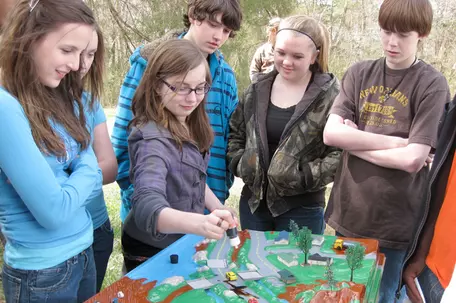Connect to the World We Live In

Building connections between academic learning and examples, experiences, and issues from beyond the ivory tower can increase students interest in a topic and help them transfer this learning to real life situations in their professional and personal lives. A spectrum of approaches can be used from simply using real examples to contextualize concepts to the more complicated use of service learning projects to allow practicing skills and applying knowledge in the local community.
Why tie sustainability topics into real world examples?Teaching Strategies and Example Classroom Activities
- Empower students and faculty to Community and Political Engagement
Community and political engagement supports better outcomes in our communities and provide students with the civic and disciplinary training needed for equitable problem solving. This includes design ideas for public engagement, locally- or policy- relevant courses, and civic programming. - Strengthen community connections with Service Learning
Service learning gets students out into the community with opportunities to apply their knowledge to concrete problems of high interest to the people who live there. Get more ideas for service learning projects and access collections of example activities. - Bring relevance to classroom concepts and skills Using Local Examples and Data
Local examples, field work and data can motivate students learning by applying concepts to the world outside their window. See other pedagogic guidance and ideas for incorporating local examples and data as well as teaching materials and resources. - Engage students with examples they can relate to by Using Real World Examples
Real world examples give us case studies and data to help students understand how concepts apply to the world beyond the area they can experience directly. Explore strategies for using case studies and a rich set of examples. - Demonstrate and practice practical skills by Utilizing Field Work
First-hand observation of the natural world creates a special kind of connection between students and the Earth. Take a look at some example activities that utilize field work, including those that can be done in an urban environment as well as those that incorporate service learning. - Teach Sustainability and Social Justice through Contrasting Narratives
Explicitly comparing and contrasting narratives about the same topic, or how a story changes through time, can illuminate differences in the ways different communities or members of a community view an event or topic, or changes in the way an event or topic is viewed by a community as their perspective changes over time.
Module 4: Food and Water
Gigi Richard, Fort Lewis College
Module 9: Climate Change
Gigi Richard, Fort Lewis College
Module 6: Crops
Heather Karsten, Pennsylvania State University-Main Campus
Module 8: Pests and Integrated Pest Management
Heather Karsten, Pennsylvania State University-Main Campus
Module 10: Food Systems
Steven Vanek, Pennsylvania State Univ-Penn St. Erie-Behrend Coll; Karl Zimmerer, Pennsylvania State University-Main Campus
Module 11: Human-Environment Interactions
Steven Vanek, Pennsylvania State Univ-Penn St. Erie-Behrend Coll; Karl Zimmerer, Pennsylvania State University-Main Campus
Module 7: Soils and a Systems Approach to Soil Quality
Heather Karsten, Pennsylvania State University-Main Campus
Module 2: History of Food Systems
Steven Vanek, Pennsylvania State Univ-Penn St. Erie-Behrend Coll; Karl Zimmerer, Pennsylvania State University-Main Campus
Module 1: Introduction
Steven Vanek, Pennsylvania State Univ-Penn St. Erie-Behrend Coll; Karl Zimmerer, Pennsylvania State University-Main Campus
Module 3: Diet and Nutrition
Steven Vanek, Pennsylvania State Univ-Penn St. Erie-Behrend Coll
Capstone Project Stage 1
Gigi Richard, Fort Lewis College
5. Passive Designs
Randolph Chambers, College of William and Mary
8. Efficiency and Conservation
Maurice Crawford, University of Maryland-Eastern Shore
11. Composting Toilets
Maurice Crawford, University of Maryland-Eastern Shore; Benjamin Cuker, Hampton University
7. Better Ways to Illuminate
Maurice Crawford, University of Maryland-Eastern Shore
Unit 2: Community-Based Participatory Solutions
Richard D. Schulterbrandt Gragg III, Florida Agricultural and Mechanical University; John Warford, Florida Agricultural and Mechanical University; Cynthia Hewitt, Morehouse College; Akin Akinyemi, Florida State University; Cheryl Young, Heritage University
Resource Collections
- Service learning example projects, from Pedagogy in Action, contains projects from the sciences, economics and education.
- Service learning projects, from On the Cutting Edge, has examples from the geosciences.
- Using Real World Examples such as case studies, field work, and using local data
- Campus Based Learning activity collection from Pedagogy in Action, offers a what, why and how for using this pedagogy as well as examples you can use or modify for your classroom
- Experience-Based Environmental Project examples, including the Lifestyle Project, from Pedagogy in Action
- Washington Center's Curriculum for the Bioregion offers examples of six Promising Pedagogies for teaching about sustainability issues. This page describes these pedagogies and offers resources to learn more about why they work and how to use them in your classroom.